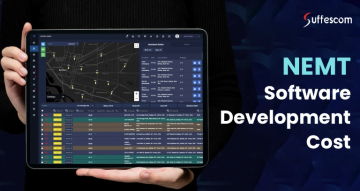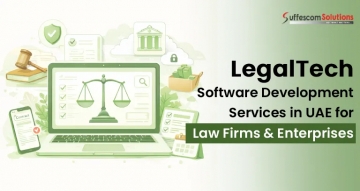Mobile App Development Cost in UK (2026- Guide)
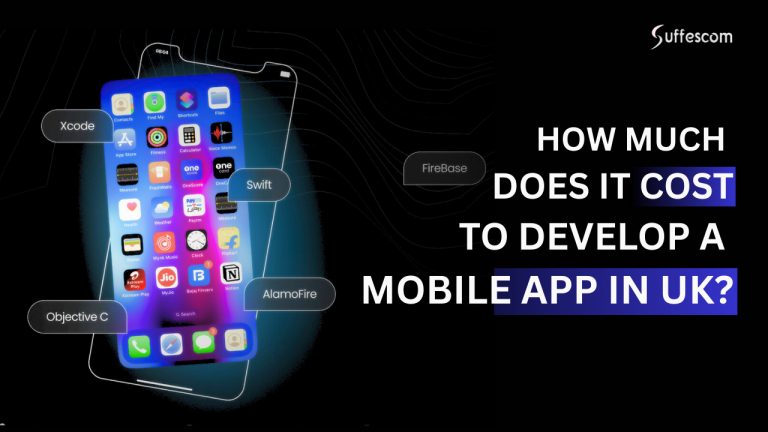
Key takeaways:
- Mobile app development cost in UK ranges from £11,000 to £125,664 ($15,000 to $170,000).
- Factors like app type, UI/UX strategy, platform choice, team size, and developer expertise play an important role in the total cost.
- A basic mobile app takes 2-4 months to develop, while an advanced app may take 9-18 months.
- Hidden and post-launch costs, such as cloud infrastructure and ongoing support, are crucial to consider for long-term success.
Creating a mobile application in the UK is considered a big leap for businesses in 2026. There is a highly rising demand for digital services, and customers are seeking a fast and convenient mobile experience. This is what is making businesses start selling their services through mobile applications. A good application enhances the identity of a business, provides direct access to customers, and offers a competitive advantage over the competition. However, the biggest question is how much it costs to develop an app.
So, the cost of app development in the UK can vary based on your unique business requirements and needs. If you are a startup founder or a business looking to go digital in its services, then it is very important to understand all the cost considerations.
To give a rough estimate, the mobile app development cost in UK generally ranges from £11,000 to £125,664 (that’s about $15,000 to $170,000) or more, depending on the specific needs.
In this blog, we'll discuss a complete overview of how mobile app development costs are determined in 2026.
Mobile App Market Statistics in UK
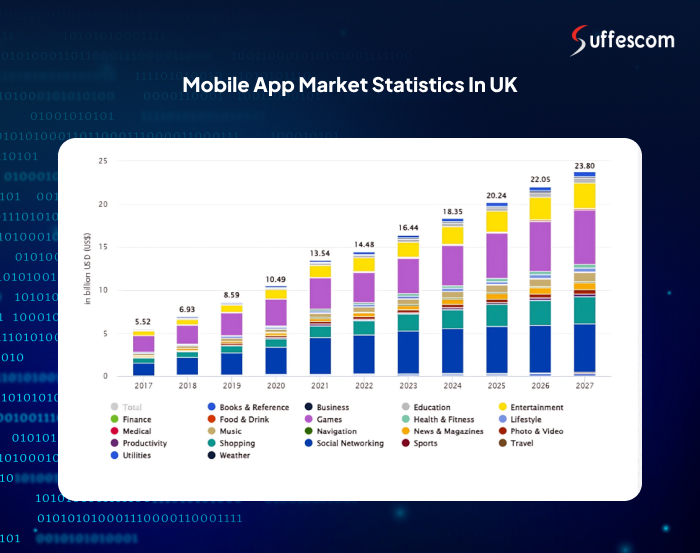
Let’s discover some interesting statistics that show the growth of mobile apps in the United Kingdom.
Growth of Mobile Apps in the UK
The mobile app market in the UK is steadily growing. While previously only large businesses commissioned apps, now small and medium-sized businesses are also using mobile apps to reach their customers. The increasing penetration of smartphones and the internet has further accelerated this market.
Today, mobile apps are being used in every sector in the UK. People's everyday tasks are now made easier through apps, further increasing the demand for mobile app development.
Rising User Base
A 2023 survey found that the UK app market has 50.8 million smartphone users (75.8% of the total population) and that 2.3 billion times the apps had been downloaded by the users. These figures further indicate that mobile applications are bright in the future in the UK. Businesses that invest in them early will be able to reach customers faster and better. This is not just an investment in technology, but also the best way to retain customers for the long term.
Cost to Develop a Mobile App in UK (2026)
As we already discussed, the cost to develop a mobile app in UK can start from £11,000 and go upto £125,664. But the overall cost is highly dependent on various core values like app complexity, platform, and a lot more. So, let’s delve deeper into those factors in depth and detail.
Estimated Mobile App Development Cost
| Complexity Level | Estimated Cost (GBP & USD) | Key Features | Development Duration | Examples of Apps |
| Basic | £11,000 – £20,000 ($15,000 – $27,000) |
| 2 – 4 months | Note-taker app |
| Moderate | £21,000 – £52,000 ($28,000 – $68,000) |
| 4 – 6 months | Taxi app, property management apps, food delivery apps |
| Complex | £53,000 – £75,000 ($70,000 – $101,000) |
| 6 – 9 months | Rental Marketplace, NFT Marketplace |
| Advanced | £76,000 – £125,664 ($102,000 – $170,000+) |
| 9 – 18 months | AI Companion, Crypto exchange app, Trading App |
Factors Affecting Mobile App Development Cost in UK
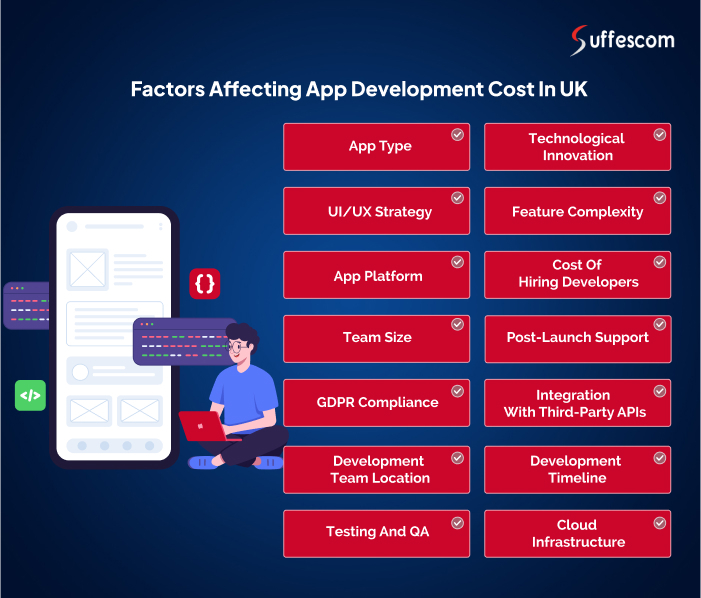
There are many factors that contribute to the overall cost of creating a mobile app in the UK. Let’s discuss them in detail.
App Type
The type of app is the biggest factor. A small or basic app is quick to build. It has a few screens, a login, and simple functions. Such apps cost less. If the app requires more functions, such as a payment system, chat, live data, or a custom dashboard, both time and money increase. Such apps require a separate team and experts.
For example, a simple car rental app consisting of a search and booking feature would be cheap to develop. Conversely, a complicated car rental application including the GPS location and the integration with third-party payment gateways and multi-language support options would cost a lot more to develop. So, first, determine the level of the app. This gives you a clear picture of the cost.
UI/UX
Design and experience are what keep users engaged with an app. A simple design is cheaper. It doesn't require much research and testing. Colors and layout are also basic. But if you want your app to look and feel unique, you need a custom design. This involves wireframes and prototyping. This can add up to both money and time. Good UI/UX creates fewer problems later and engages users more.
| Design Level | Cost (USD & GBP) | Description |
| Simple Design | £750 – £2,200 $1,000 – $3,000 | Simple color schemes |
| Customized Design | £3,000 – £4,500 $4,000 – $6,000 | Custom illustrations |
| High-End Design | £4,815+ $6,500+ | Advanced animations |
App Platform
In building a mobile app, platform selection is an important aspect, as developing native apps, which are developed separately is expensive, whereas developing cross-platform apps is cheaper, as it uses a single codebase. However, the final decision should be based on your precise needs for mobile app development.
| App Type | Estimated Development Cost |
| Native App (iOS, Android separately) | £30,000 – £125,000+ ($40,000 – $168,000) |
| Cross-Platform App | £11,000 – £100,000+ ($14,800 – $130,000) |
GDPR Compliance
For building mobile applications in UK, it is mandatory to comply with the rules of data protection. Moreover, the GDPR (General Data Protection Regulations) states that the personal information of users should be safeguarded. Breach of these rules may lead to huge fines. Applications should include features that guarantee data security and the confidentiality of users. This is in terms of password protection, data encryption, and user consent. In addition, applications are supposed to explicitly provide information regarding the data being gathered and its purpose of use. Such features require developers to use more time and resources and raise the cost of the app.
A data protection impact assessment (DPIA) is another step that is important. This evaluates the risk that the use of data in the app presents and, in case, how to reduce it. The privacy policy and terms of the app also have to be in compliance with the law.
The GDPR is not a restricted issue to the development of apps. The apps need regular updates, surveillance, and audits even after their launch. This can be costly in the short run, but considering the trust given by the user and the penalty it can incur in the future, it will be worth the investment.
Team Size
The size and experience of the team also have an important influence on cost. A smaller team will be less expensive; however, time will be taken to do the work, and sometimes the quality may not be good. The more experienced and bigger teams work faster and provide better quality work, but they are more expensive.
| Team | Hourly Rate (Approx) |
| Project Coordinator | $20 – $30 (£15 – £22) |
| Lead Backend / Frontend Engineer | $27 – $31 (£20 – £23) |
| Senior Mobile App Engineer | $23 – $27 (£17 – £20) |
| Senior Web & Server Developer | $28 – $38 (£22 – £30) |
| DevOps Specialist | $20 – $27 (£15 – £20) |
| Business Systems Analyst | $18 – $20 (£13 – £15) |
| UI/UX Designer | $20 – $24 (£15 – £18) |
| Quality Assurance Engineer | $16 – $22 (£12 – £16) |
Development Team Location
The location of the development team and their experience are also important in knowing the budget. Developers from large cities may be more expensive, but they have more experience and the right approach. Smaller teams or offshore might be cheaper, yet they need more thorough attention to communication and time zones. Frequently, companies select a hybrid system; some tasks are performed by a local team and some by an offshore team.
| Region | Hourly Rate (USD) | Hourly Rate (GBP) |
| UAE | $54 – $61 | £40 – £45 |
| US | $87 – $97 | £65 – £72 |
| Western Europe | $61 – $80 | £45 – £60 |
| Australia | $67 – $80 | £50 – £60 |
| Eastern Europe | $38 – $48 | £28 – £36 |
| Asia | $21 – $32 | £16 – £24 |
Testing and QA
The conditions for a good app to be successful are guaranteeing that it is stable, safe, and error-free. There should be a lot of testing. This encapsulates all types of testing. The deeper the testing, the more expensive it is, yet it may help to avoid technical difficulties and negative feedback in the future. It is also costly to fix bugs after they have been launched, and when dealing with bugs, it can be exponentially more expensive than testing in the long run.
| Testing Type | Estimated Cost (GBP) |
| Functional Testing | £650 – £980 |
| Automation Testing | £980 – £1,470 |
| Performance / Load Testing | £1,050 – £1,630 |
| Mobile App Testing | £720 – £1,140 |
| Security / Penetration Testing | £1,470 – £2,050 |
| Test Management | £1,220 – £1,800 |
| Advanced / Senior QA | £980 – £1,470 |
Technological Innovation
The use of new and innovative technologies in the development of mobile apps enhances scalability. Nonetheless, it may also become more expensive in terms of development when new technologies, specific feature development, or specialist hiring are added.
The initial investment is often required to train or recruit specialists on new technological tools or platforms by businesses. Therefore, it's crucial to adopt innovation smartly. Using new technologies with the right planning and strategy improves app quality and creates more value for users in the UK market.
Feature Complexity
The advanced the features of the app, the more design, coding, and testing will be needed. The most fundamental functions, such as the login, profile, and content page, can be created in a comparatively short time and on a budget. But the cost and time are escalated due to such additions as payment gateways and live streaming. The best way would be to release the basic features only initially and launch the additional features as updates.
| Feature Complexity | Example Features | Estimated Cost (USD) | Estimated Cost (GBP) |
| Simple | Login, User Profile, Basic Content Pages | $5,380 – $10,700 | £4,000 – £8,000 |
| Medium | Payment Gateway, Social Media Integration, Push Notifications | $10,700 – $27,000 | £8,000 – £20,000 |
| Complex | Live Streaming, Real-time Updates, Custom Dashboards, AI/ML Features, Advanced Analytics | $27,000 – $54,000 | £20,000 – £40,000 |
Cost of Hiring Developers
The type of developers you hire for your mobile app development UK impacts the cost. Decide on the developer you will be requiring according to project needs.
Estimated Cost of Hiring Developers
| Role | Hourly Rate (GBP) |
| Hire dApp Developer | £20–£25 |
| Hire Ethereum Developer | £22–£26 |
| Hire Smart Contract Developer | £21–£23 |
| Hire Core Blockchain Developer | £20–£22 |
| Hire Swift Developer | £20–£21 |
| Hire Rust Developer | £23–£25 |
| Hire AI Developer | £25–£30 |
| Hire Kotlin Developer | £22–£24 |
| Hire Casino App Developer | £20–£22 |
| Hire Solidity Developer | £21–£24 |
| Hire Web3 Developer | £20–£24 |
| Hire MEAN Stack Developer | £24–£28 |
| Hire React.js Developer | £20–£22 |
| Hire NFT Developer | £26–£30 |
| Hire React Native Developer | £20–£24 |
| Hire Hybrid Blockchain Developer | £21–£23 |
| Hire Metaverse Developer | £25–£27 |
| Hire Crypto Exchange Developer | £27–£30 |
Post-Launch Support
The app's journey begins after launch. Even after launching an app on the market, it will still require bug fixes, security updates, user comments, related improvements, and features. So, there should be a monthly or annual budgetary allocation for this. Failure to provide after-sales service may result in a decrease in ratings of the apps and loss of users.
Development Timeline
The direct effects of the timeline on cost in the project are direct. In the case of urgent custom application development, the development team might be required to overwork or to add more resources, which raises costs. A flexible schedule enables the team to work more effectively, and budgets are not bloated.
Cloud Infrastructure
Most apps today run on the cloud. These benefits are scalability of servers, storage, and security. This is, however, at the price of a monthly or yearly fee. Cloud is not cost-effective at first, but on a long-term basis, it offers powerful and sustainable infrastructure. Businesses are thus advised to identify the type of cloud model (public, private, and hybrid) that best fits them.
Integration with Third-Party APIs
Frequently, applications require being connected to a payment gateway, Google Maps, chat systems, email services, or social media logins. This incorporation takes time and experience. There are also third-party services that are charged monthly or annually. So, their prices and their dependability must be considered prior to incorporating these services.
App Development Cost Comparison Across UK Cities
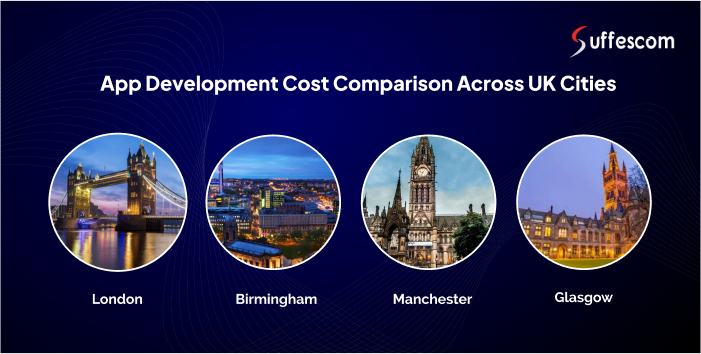
Mobile app development costs in the UK vary by city. The main factors are developer experience, office expenses, and local economic status. Let's take a look at the major cities.
London
App development costs are highest in London. This city is known for top-level developers, advanced technology, and large office expenses. If your project is complex and requires high quality, investing in London may result in better app quality.
Birmingham
Costs in Birmingham are lower than in London. Talented developers are available here, but fees and office expenses are relatively low. Birmingham may be an affordable option for apps of medium complexity.
Manchester
Development costs in Manchester are even more affordable. This city is suitable for startups and mid-budget projects. The teams here are professional and the quality of work is also high.
Glasgow
The lowest cost in the development of apps is in Glasgow. The city will be the best option for projects with lean budgets. Only for complex apps there may be limited resources.
Estimated App Development Cost Across Cities
| City | Estimated Cost (GBP) |
| London | £23,000 – £46,000 |
| Birmingham | £19,000 – £38,000 |
| Manchester | £17,000 – £34,000 |
| Glasgow | £15,000 – £30,000 |
Note: Despite the higher cost in London, the city is the most suitable in terms of app development because it has the best developers and opportunities. In case you are concerned with the quality of your app, then investing in London is the right decision.
Hidden Mobile App Development Costs in UK
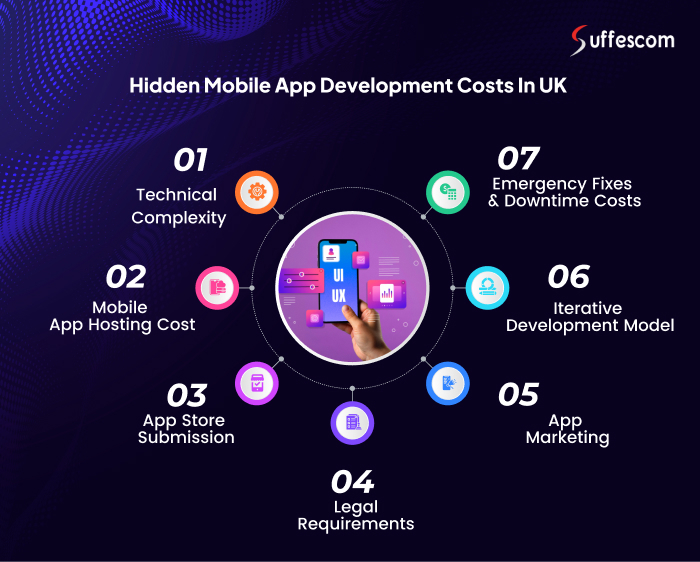
The cost of developing a mobile app in the UK isn't limited to design and coding. There are hidden costs as well that you need to be aware of. Knowing these costs in advance can help manage both budget and timelines.
Technical Complexity
The more intricate the custom mobile app is, the more cost will be. For instance, the development team will need more time and effort if the app requires custom dashboards or AI capabilities. This is why technical complexity increases costs.
Mobile App Hosting
On-premise or cloud-based hosting is required to run an app. Hosting costs depend on the app's size and user traffic. Apps with higher traffic may require increased server capacity, which also increases costs. Data backup and storage costs are also included.
App Store Submission
Submitting apps to iOS and Android platforms also adds additional costs. The Apple app store and Google Play Store have different fees. Additionally, app approval takes time, often requiring the development team to work on improvements.
Legal Requirements
In the UK, apps are obliged to be in line with the legal regulations and data protection laws. It includes GDPR regulations, privacy policies, and terms of service. Legal services are mandatory in preparing such requirements, which makes them costly.
App Marketing
Once an app is launched, there is also a need to advertise and sell it. Digital advertising, promotional activities, and social media are expensive. It is not easy to grow the number of app users without marketing.
Iterative Development Model
Apps often require frequent updates and improvements. Each change requires coding, testing, and time which increases costs. Moreover, clients sometimes underestimate the expenses for version control and enhancement.
Emergency Fixes & Downtime Costs
Sometimes, apps encounter bugs or technical issues. App developers UK have to spend additional time fixing them immediately. Server downtime also disrupts app usage and increases costs.
Estimated Hidden Costs in UK
| Cost Type | Estimated Cost (GBP) |
| Technical Complexity | £4,000 – £12,000 |
| Mobile App Hosting | £800 – £4,000 |
| App Store Submission | £80 – £400 |
| Legal Requirements | £1,600 – £4,800 |
| App Marketing | £2,400 – £8,000 |
| Iterative Development Model | £1,600 – £5,600 |
| Emergency Fixes & Downtime | £1,200 – £4,000 |
Struggling to Estimate Your Mobile App Budget?
Get a clear cost breakdown for your mobile app development needs.
Mistakes that Increase App Development Costs
There are many reasons behind budget overruns in mobile app development. Often, these costs increase unintentionally due to some common mistakes made in the project. It's important to be aware of these and avoid them to save both time and money.
Unclear Requirements or Scope Creep
The biggest mistake is the lack of a clear plan and requirements. When the app's features and functional scope are unclear, and the development team makes frequent changes. This is called scope creep.
For example, if only basic login and profile features were initially planned and later many new features are suddenly added, the coding, design, and testing time increases. This also increases costs unexpectedly. Therefore, it's crucial to prepare a complete project plan and feature list before developing an app.
Skipping Market Research & User Validation
Failing to study the market and user needs is also a costly mistake. If you develop an app without research, it's possible that it cannot be that useful or appealing to people.
Market investigation and user testing would tell us what features people would like to see, what design they would like to see, and which section of the application would be utilised the most. Under Research may make app developers UK make improvements later, which will add to the time and costs.
Choosing the Wrong Tech Stack
Choosing the wrong technology platform or tools also adds costs. As an example, when you are willing to create both Android and iOS apps and make the wrong choice of technology, development may be complicated and costly.
In other cases, it is not right to adopt a new technology when the team lacks experience with it. This may create an error in coding and further time in testing and refinements. Hence, it is important to select the appropriate programming language and tools.
Ignoring Post-launch Updates
Sometimes, businesses neglect updates and maintenance after app launch. However, bugs in apps should be resolved immediately and features need to be updated over time.
If updates and improvements aren't planned in advance, new teams will have to be employed every time, which makes it more expensive. Moreover, the level of satisfaction of current users can decrease.
Cost Optimisation Strategies to Create a Mobile App
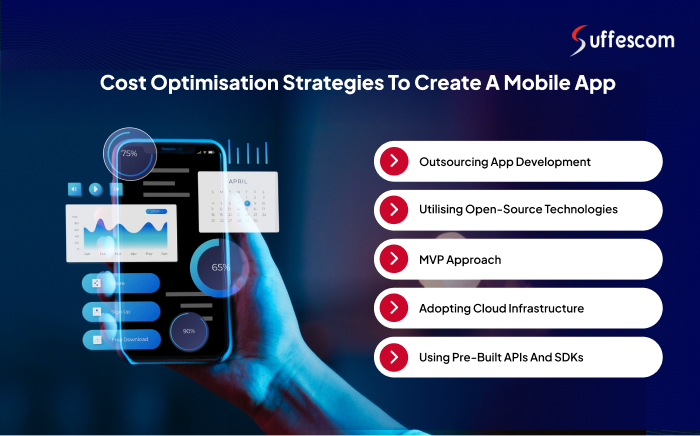
Developing a mobile app can be expensive, but some simple steps can optimise mobile app development costs.
Outsourcing App Development
One way is to outsource app development. This means hiring a bespoke mobile app development agency or even a freelancer rather than having a whole team in your office. This will save money in terms of salaries, office costs, and infrastructure.
The pros of outsourcing are that you can readily get individuals with specialised skills and do not incur huge expenses on small or medium budget projects.
Utilising Open-Source Technologies
Using open-source technologies is also a good option. These are available for free or at a low cost and reduce development time.
Using open-source tools (Node.js, Flutter) and libraries reduces the need to create new components yourself. This reduces costs on coding, testing, and design.
MVP Approach
Adopting an MVP (Minimum Viable Product) approach is a smart approach. In this, an app is initially launched with only the basic and essential features. New features are added later based on user feedback and needs. This saves unnecessary costs and time for small startups and new projects.
Adopting Cloud Infrastructure
Cloud platforms (AWS, Google Cloud) have the potential to save on hardware and server expenditures. There are no maintenance or upgrade expenses because the apps would be hosted on the cloud rather than physical servers.
Cloud-based apps can be scaled easily, and hence the server will automatically update when the users increases. This also reduces costs in the long run.
Using Pre-built APIs and SDKs
Developing with ready-made APIs and SDKs is more cost-efficient and time-saving. These can be used to add such common features as payment gateways, maps, or social logins without much effort and time.
Having to make everything new would result in time and cost surge in development. Ready-made tools save on the time taken in coding and testing, and the application is prepared more quickly.
Also Read: Android App Development Cost
Key Trends Shaping Mobile App Development Costs in 2026
Mobile app development costs aren't limited to design and coding. Over time, there are new advancements and trends that influence the overall cost.
Adoption of New Technologies
The emergence of new technologies has changed the app development process. Advanced technologies are improving the quality of apps, but come with additional cost.
AI (Artificial Intelligence)
AI features such as smart suggestions, chatbots, or personalisation make apps more useful. However, adding AI requires data analysis, model training, and testing. These features initially cost more than standard features but give long-term benefits.
Emerging AI solutions to integrate into Mobile Apps
| Category | Services | Use Cases |
| AI Solutions for Business | AI Development Services | Automating workflows and decision-making |
| AI Integration Services | Enhancing existing apps with AI capabilities | |
| Adaptive AI Development | Evolving systems based on user behaviour | |
| AI Consulting Services | AI strategy planning and implementation | |
| Generative AI Development | Content generation, creative automation, marketing campaigns | |
| AI in Healthcare & Logistics | AI Healthcare Software | Patient monitoring, predictive diagnostics |
| AI Logistics Software | Route planning, supply chain optimisation | |
| AI Chatbots & Agents | AI Chatbot Development | Customer support automation |
| AI NSFW Chatbot Development | Moderation of user-generated content | |
| AI Agent Development | Virtual assistants and task automation | |
| AI in Education | AI eLearning Software | Adaptive learning, personalised courses |
Blockchain
Blockchain technology is used for security and transaction tracking. Adding it increases app security and reliability. However, smart contract development and ledger integrations increase development costs.
IoT (Internet of Things)
Integrating apps with IoT devices, such as wearables or sensors, provides a more interactive experience for users. However, device integration and data synchronisation require more effort and increase the mobile app development cost UK.
Quantum Computing
Quantum computing is slowly making an impact on the development of an app. It is useful for large data sets and complex algorithms. However, it increases development costs.
AR/VR (Augmented Reality / Virtual Reality)
AR and VR make today’s mobile applications more immersive for users. These technologies are popular in various domains. However, 3D modelling and rendering increase costs.
Different Development Methodologies
The development process and approach also impact costs. Some new and effective methods save both time and expense, while others can prove costly.
Low Code / No Code
Low-code/no-code platforms make development quicker and simpler. These platforms include less coding and a more visual interface. The starting cost is lower, but there may be limitations when adding complex features.
Agile Development
In agile development, the app is built, tested, and updated in small iterative steps. This approach helps to incorporate user feedback quickly. But updates and testing may increase costs a little bit.
Hybrid Development
Hybrid app development helps in deploying a mobile app fastly in app platforms like iOS and Android. This saves both development time and cost, but performance can sometimes be limited.
Feature-Driven Development
In feature-driven development, each feature is planned and developed separately. This approach is suitable for custom features in complex apps, but if there are more features, then it would require more cost.
Integration with Wearable and Connected Devices
Integrating an app with a connected device enhances the user experience. However, development becomes expensive due to the need for data synchronisation and sensors.
Cross-Device Compatibility
Users should be able to access apps on various devices. Hence, it is important to make apps specific to every device and screen size. Cross-device compatibility requires more testing and coding during development, but enhances user experience and makes it successful in the long term.
Real-Time Data Processing
Many apps require instant processing of user data. Real-time data processing requires strong server capacity and backend infrastructure. This can increase development costs, but it improves app performance.
Different Industries Impacting Mobile App Development Cost
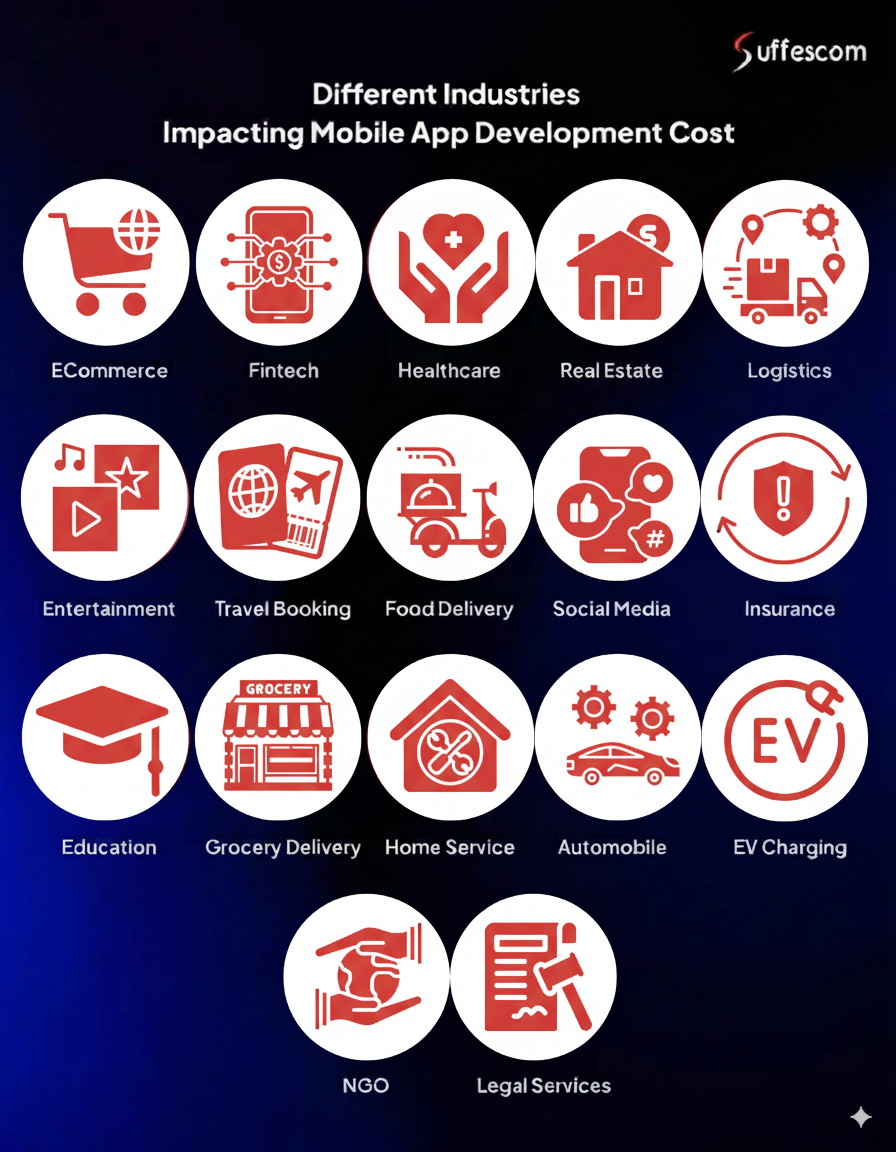
The cost of a mobile app depends heavily on the industry in which the app is being developed. Moreover, the requirements, features, and security standards in various industries vary. Thus, any app development plan and budget is developed on the specifics of the industry.
eCommerce
E-commerce applications provide customer functionalities such as product, shopping cart, payment, as well as tracking of orders. Minor features are fast to create, and it may take more time and money to implement customised features like promo codes or review systems. The applications help businesses boost their sales online.
Fintech
Fintech apps deal with transactions, payments, and investments. Securing and safeguarding users’ money is important in these apps, which need strong passwords and data security. Adding instant transaction and billing functionalities increases costs.
Healthcare
Healthcare apps require integration with EHR systems, appointment scheduling, and telemedicine. These apps help in creating convenience and trust among doctors and patients. When developing a mobile app, it is mandatory to comply with all the rules.
Real Estate
Real estate apps include property listings, location maps, virtual tours, and contact details. Back-end work would be needed to enable search and notifications for the user. Applications are easy and quick to use among the prospective buyers and sellers. Prices may be higher when features are more complex, like 3D tours or custom real-time data.
Logistics
Logistics apps are developed with features like delivery tracking and route optimisation. These apps help guarantee the timely delivery and tracking of goods. Development costs can rise if the backend needs to be built for real-time locations and a large network.
Entertainment
Entertainment apps include videos, music, games, and interactive features. Adding multimedia and streaming support to an app increases costs. These apps provide smooth entertainment for users. Adding live streaming or social sharing features can increase development costs.
Travel Booking
Travel apps include flight and hotel booking, location maps, and real-time updates. These apps help travellers with easy booking and information. Adding personalised recommendations or real-time notifications increases the mobile app development cost UK.
Food Delivery
Food delivery apps include restaurant listings, menus, order tracking, and payments. Backend in these apps is required to provide a fast and easy ordering experience. Adding features like real-time notifications and inventory updates increases time and cost.
Social Media
Social networking apps include features like user profiles, posts, sharing, chat, and notifications. Multimedia sharing and data security are important to consider in social media app development. Incorporating features like live streaming, group chat, or interactive features can increase the app development cost UK.
Insurance
Insurance apps include features like policy management and claims processing. Data security and regulatory compliance are crucial in such kind of apps. Moreover, adding functionalities like notifications or instant claim tracking increases development costs.
Education
Education apps offer features like online courses, video lectures, and more. Adding multi-device support and interactive features can further increase the cost. These apps provide students and teachers with a simple and effective digital learning experience.
Grocery Delivery
Grocery delivery apps offer features like product listings, stock updates, order tracking, and payments. In these apps, a strong backend is required for fast delivery and real-time notifications, which might increase mobile app development cost in UK.
Home Service
Home service apps include service provider listings, booking, payments, and notifications. These apps require real-time synchronisation and updates between users and the service provider.
Automobile
Automobile apps offer features like car listings, virtual test drives, and real-time location. Adding AR/3D features and multiplatform support can increase costs. The app's goal is to provide customers with smooth experiences in an easy and interactive way.
EV Charging
EV charging apps include features like station locators, booking slots, and payments. Integrating IoT connectivity and predictive analytics can increase the cost to build app in UK, but they guarantee a smooth experience for EV owners.
NGO
NGO apps focus on donations and campaigns. Adding secure payment gateways and community engagement features can increase costs. These apps aim to maximise transparency.
Legal Services
Legal service apps provide features like consultation booking, case tracking, and document management. Ensuring data security, compliance, and adding real-time chat or AI-driven legal assistance can raise the cost to build a mobile app UK.
| Industry | Estimated Cost (GBP / USD) |
| eCommerce App Development Cost | £23,500 – £65,000 ($32,000 – $88,000) |
| Fintech App Development Cost | £35,500 – £100,000 ($48,000 – $135,000) |
| Healthcare App Development Cost | £38,000 – £80,000 ($51,000 – $108,000) |
| Real Estate App Development Cost | £23,000 – £55,000 ($31,000 – $74,000) |
| Logistics App Development Cost | £28,000 – £70,000 ($38,000 – $94,000) |
| Entertainment App Development Cost | £32,000 – £85,000 ($43,000 – $114,000) |
| Travel Booking App Development Cost | £22,500 – £65,000 ($30,000 – $88,000) |
| Food Delivery App Development Cost | £28,000 – £75,000 ($38,000 – $101,000) |
| Social Media App Development Cost | £34,000 – £94,000 ($46,000 – $127,000) |
| Insurance App Development Cost | £40,000 – £110,000 ($54,000 – $148,000) |
| Education App Development Cost | £21,500 – £50,000 ($29,000 – $67,000) |
| Grocery Delivery App Development Cost | £28,000 – £62,000 ($38,000 – $84,000) |
| Home Service App Development Cost | £23,500 – £58,000 ($32,000 – $78,000) |
| Automobile App Development Cost | £35,500 – £100,000 ($48,000 – $135,000) |
| EV Charging App Development Cost | £30,000 – £85,000 ($40,000 – $115,000) |
| NGO App Development Cost | £18,000 – £45,000 ($24,000 – $61,000) |
| Legal Services App Development Cost | £32,000 – £90,000 ($43,000 – $122,000) |
How to Develop a Mobile App in UK?
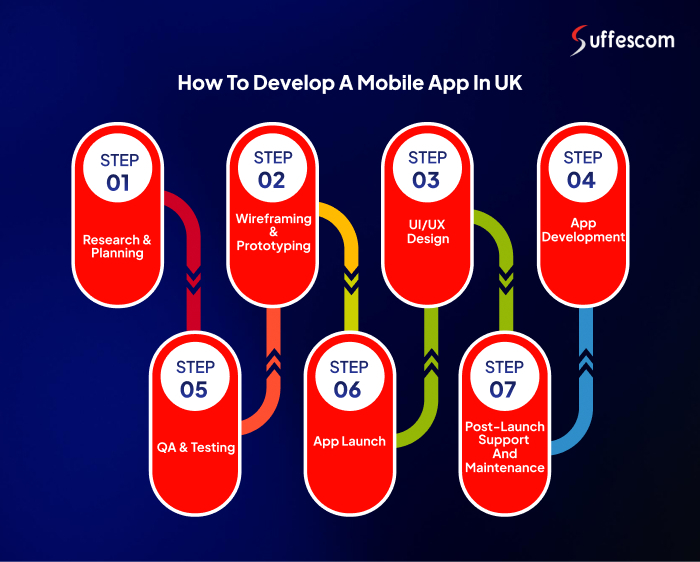
After discussing all the details about mobile app development cost in UK, let's delve into how to develop a mobile app:
Research & Planning (£550 – £10,000)
Development of a mobile application starts with proper research and planning. It's important to first define the purpose of the app. Moreover, knowing the demand of the market and the needs of the users will help in building the best app. It also involves the analysis of the competitors and features. Planning saves time and financial resources in the future and makes the development run smoothly.
Wireframing & Prototyping (£800 – £12,500)
The second step involves the development of wireframes and prototypes. Wireframes demonstrate the appearance of the screens, as well as the navigation of the app. Prototyping makes it interactive in order to get users to have an idea of how the app will operate.
This step makes it easier to make changes, reducing errors and wasted time during development.
UI/UX Design (£1,300 – £18,850)
User experience and user interface are vital to the success of a mobile app UK. UI design stipulates the arrangement of the screens, colours, buttons, and icons. The UX design allows the app to be user-friendly and intuitive.
This is also the step when user testing takes place. This helps in knowing if the design is perfect or needs enhancement.
App Development (£5,500 – £63,000)
After UI/UX, the actual mobile app development starts, which entails both back-end and front-end code. The APIs, database, and the backend server are integrated in the backend, and the screens and user interactions in the frontend are developed.
The choice of the platform, i.e., iOS or Android or both, and the technology stack are also of concern. The time and cost may be escalated when there are many features and the app is complex.
QA & Testing (£1,100 – £15,000)
Quality testing guarantees that the app works without problems. This includes various types of testing. This step involves identifying and correcting bugs. Good testing offers a smooth and stable user experience and saves on costs in the future.
App Launch (£500 – £2,500)
Prior to launch, it's required to prepare the app according to the App Store and Google Play Store regulations. This includes application data, screenshots, and advertised content. It is also essential to evaluate the initial feedback as it will help to know whether the app is functioning correctly or requires some amendments.
Post-launch Support and Maintenance (£1,200 – £14,000)
The work doesn't end after the app launch. It is necessary to upgrade it, introduce new functions, and eliminate bugs. With proper maintenance and support, the app will be useful and reliable in the long term.
Also Read: 8 Essential Phases of Mobile App Development Lifecycle.
How to Choose a Mobile App Development Company in the UK
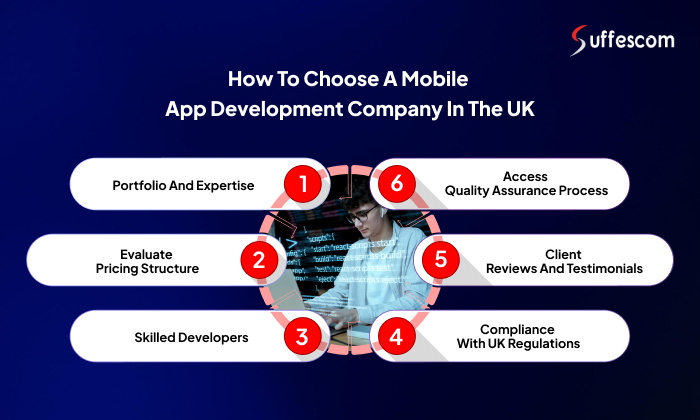
When choosing a bespoke mobile app development company in UK, it's essential to consider a few key aspects.
Portfolio and Expertise
Look at the company's past projects. Try to understand what types of apps the company has built. Whether their experience and expertise are a good match for your app.
Evaluate Pricing Structure
The development budget and costs should be clear. It's important to understand how the company charges such as fixed price, hourly, or by features.
Skilled Developers
The development team should consist of skilled and experienced developers. Determine their mastery of iOS, Android, or cross-platform technology.
Access Quality Assurance Process
Check the QA and testing process of the app development company UK. This guarantees that the app will be bug-free. Good testing helps in the app's growth.
Client Reviews and Testimonials
Read feedback and recommendations of former customers. This will give you details on the reliability of the company, the delivery of projects, as well as support.
Compliance with UK Regulations
The app developers UK should comply with regulations and data protection laws. Knowledge of GDPR and other regulations is vital.
Looking to Save Big on Mobile App Development Costs?
Cut expenses by up to 40% with our AI-powered development approach
Suffescom’s Proven Excellence in Mobile App Development
We are a leading mobile app development agency that has delivered more than 1000+ projects according to the client’s needs.
Medicover Online
With over 500K downloads, we have developed an app that helps in easily booking an online appointment with the doctor for any medical help. The app features easy rescheduling and cancellation, with the ease of getting reports at home.
Mealed
At Suffescom, we have developed an easy food ordering platform. With a 4.9 rating, the app experienced a 56% increase in orders within the first 2 months and reduced delivery costs by 43%.
1 TimeShop
We have created an all-in-one platform that provides food delivery with taxi booking services. The app has already raised 30 M+ funds with 10K+ payment modes.
PRO RIDE
As a bespoke mobile app development company in London, our developers have built an app that allows drivers to offer services based on their location and availability.
StealthEX
We have developed a digital-currency platform that offers 400 different currencies. With a 4.6 rating, the app features the best security and privacy during transactions on the platform.
Monetisation Strategies for Your Mobile App
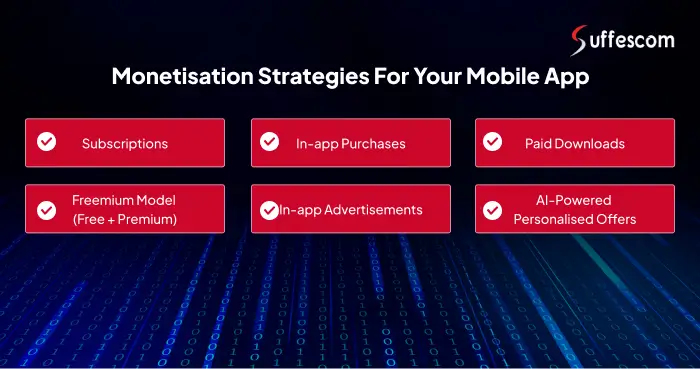
Let’s discover different monetisation models by which you can generate revenue and boost your app's success.
Subscriptions
The user pays for app features either on a monthly or an annual basis. This is a way of generating continuous revenue that helps boost your overall ROI.
In-app Purchases
The user can purchase additional features or items within the app, which can be new levels in a game, exclusive items, or premium products in e-commerce. This is because it allows users to spend according to their needs.
Paid Downloads
The user makes a one-time payment to download the app. This gives direct revenue, but it is also necessary to show that the app is functional and it works.
Freemium Model (Free + Premium)
The basic version of the app is free. This provides the user with an opportunity to use the mobile app and a suitable option to upgrade in the future.
In-app Advertisements
The other revenue source is advertisement within the application. The adverts need to be featured in a way that it does not disrupt the user experience.
AI-Powered Personalised Offers
Apps use Artificial Intelligence to offer promotions or premium content according to user behaviour, which boosts conversion rates.
How Suffescom Helps You Build the Best Mobile App in the UK
Suffescom creates mobile apps that are specific to your business. Our team first knows your goals and user requirements. Then, we strategise the app and create a design that is simple and appealing. We ensure the app has all the required features and is safe. This approach will help in making an app that resonates with users.
We assist in every mobile app development stage. Our mobile app development company UK also provides support and maintenance after the app is launched. Furthermore, we leverage new features and technology to guarantee your app remains updated. Suffescom's goal is to make your app successful and user-friendly in the UK market.
Want Your Mobile App to Stand Out in 2026?
Contact us today to turn your idea into a feature-rich app loved by users!
FAQs
1. How much do UK app developers typically charge per hour?
In the UK (2026), app developer's hourly cost is based on experience, location, and project type. Here’s the breakdown:
- Junior Developers (1–2 years exp.)- £30 – £45 per hour
- Mid-level Developers (3–5 years exp.)- £45 – £60 per hour
- Senior Developers / Specialists (5 years+)- £60 – 100+ per hour
2. Does hiring a UK-based agency cost more than outsourcing abroad?
Yes, hiring a UK-based agency costs more than outsourcing abroad, especially in other countries like India, the Philippines and China, where app development costs might be cut down by 50%
3. What is the average cost of developing a simple app in the UK?
The average cost to develop a simple mobile in the UK can start from £11,000 to £20,000. It depends on factors like:
- App Complexity
- Feature Complexity
- Choice of Platform
4. How do maintenance and updates affect long-term app costs?
Maintenance and updates are important to keep an app running smoothly. It costs around 15-20% of the initial mobile app development cost, and key aspects include:
- Bug-fixing
- Feature enhancement
- Regular updates
5. Which technology stack is most commonly used for mobile app development in the UK?
In the UK, mobile apps are typically developed using either native or cross-platform technologies:
- iOS: Swift or Objective-C
- Android: Kotlin or Java
- Cross-Platform: Flutter, React Native, or Xamarin
Cross-platform frameworks are utilised for quick development and cost efficiency, while native development is chosen for high-performance apps.
6. Should I build a native app or a cross-platform app to save costs?
If you want to save mobile app development cost and develop for both Android and iOS at the same time with a single codebase, then opt for cross-platform app development. But if you want custom features and long-term success, choose native app development. It is costlier but provides better device-specific functionalities.
7. How long does it typically take to build a mobile app in the UK?
The typical time to build a mobile app based on app complexity is:
- Simple Apps: 2-4 months
- Moderate Apps: 4-6 months
- Complex Apps: 6-9 months
- Advanced Apps: 9-18 months
8. What are the main stages of mobile app development?
The main stages of mobile app development are:
- Research and Planning
- Wireframing and Prototyping
- UI/UX Design
- App Development
- Testing & QA
- App Launch
- Post-launch Support
9. How does app complexity (basic, medium, enterprise-level) impact development time and cost?
App Complexity directly affects both development time and cost:
Basic apps: Simple features, minimal integrations, single platform.
- Time: 2–4 months
- Cost: £11,000 – £30,000
Medium-complexity apps: More features, backend integration, possible cross-platform development.
- Time: 4–8 months
- Cost: £30,000 – £60,000
Enterprise-level apps: Complex features, AI, multi-platform, third-party integrations, high security.
- Time: 8–12+ months
- Cost: £60,000 – £125,000
10. Can app prototypes or MVPs reduce overall project costs?
Yes, developing app prototypes or MVPs can reduce overall project costs, and the key benefits are:
- Early issue detection
- Cost and Time Efficiency
- User-Centric Design
- Risk Prevention
11. Do UK developers provide integration with third-party services (like payment gateways, CRMs, or APIs)?
Yes, UK app developers provide integration with third-party services like payment gateways, CRMS, or APIs. Here’s a breakdown:
- Payment Gateways: Stripe, PayPal, Braintree
- CRM: Salesforce, HubSpot
- APIs: Google Maps, Twilio (SMS/Calls), OpenWeather, social media APIs (Facebook, Instagram, Twitter)
- Analytics & Tracking: Google Analytics, Mixpanel, Firebase
12. What data protection laws impact mobile app development in UK?
Mobile app development in UK should comply with data protection rules, which are:
- UK GDPR: Governs how user data is stored and used.
- PECR: It governs electronic communications, cookies and marketing.
13. How does GDPR affect mobile app development costs?
Compliance with GDPR will increase mobile app development costs by 5-10% based on how sensitive the data is. This includes:
- Data Encryption
- Secure Authentication
- Access Controls
- Privacy Policy
- Consent management
14. Do I need to comply with PCI DSS if my app processes payments?
Yes, if your mobile app processes, stores, or transmits payment card information, you must comply with the Payment Card Industry Data Security Standard (PCI DSS).
Key PCI DSS requirements for mobile apps include:
- Protecting stored cardholder data
- Encrypting the transmission of cardholder data.
- Preventing unauthorized access and privilege escalation.
- Using protective measures like Web Application Firewalls (WAFs) on public-facing interfaces.
15. Is accessibility compliance mandatory for mobile apps in the UK?
Yes. Mobile apps in the UK are expected to comply with accessibility standards to guarantee they are usable by people with disabilities. This includes following:
- UK Equality Act 2010 – Requires reasonable adjustments for accessibility.
- Web Content Accessibility Guidelines (WCAG 2.1) – Best practice for digital accessibility.
16. What security measures are required to protect user data in an app?
The security measures that are required to protect user data in an app are:
- Data Encryption
- Secure Authentication
- Security testing
- Data Minimisation
- Compliance with regulations
17. Do healthcare or finance apps require additional compliance standards in the UK?
Yes, healthcare or finance apps require additional compliance standards in UK like:
- NHS clinical risk management
- NHS information standard DCB0129
- UK GDPR and Data Protection Act 2018
- Medical Device Regulation (MHRA)
- FCA Regulations (Financial Conduct Authority)
18. How can non-compliance penalties affect the overall cost of app development in the UK?
Non-compliance penalties will increase the overall cost of app development in UK, besides damaging brand reputation. The financial impact of non-compliance is:
- GDPR Fines and Penalties can go up to 20 million euros (£ 1,74,58,600) for any severe violation as stated in Art. 83(5) or 4% of global revenue. For any less severe violation, the fine is 10 million euros (£ 8,72,93,00) or 2% of global revenue.
- Loss of trust and brand identity
- Audits and legal processes might delay app launch.
19. Which app features tend to increase development time and cost the most?
The app features that tend to increase app development time and cost are:
- User Authentication & Security: €5,750 – €17,250
- Real-Time Features: €11,500 – €34,500
- Payment Integrations: €5,750 – €17,250
- AI & Machine Learning: €17,250 – €69,000
- Location-Based Services: €5,750 – €23,000
- Offline Functionality & Data Sync: €5,750 – €23,000
- Third-Party API Integrations: €5,750 – €17,250
- Complex UI/UX Animations: €5,750 – €23,000
20. How does building an MVP or prototype affect the budget compared to a full-featured app?
Building a Minimum Viable Product (MVP) or prototype is cheaper than developing a full-featured app because it focuses only on the core functionalities.
- Cost savings: Typically 40–60% lower than full app development.
- Faster development: MVPs can be built in weeks instead of months, reducing development hours.
- Risk reduction: Early testing with real users helps identify issues before investing in full development.
21. Are AI, AR, or advanced analytics commonly included features that impact costs significantly?
Yes, AI, AR, or advanced analytics are commonly included features that increase cost because they require:
- Development skills
- Additional testing
- Complex integrations
22. Can customization and third-party integrations raise the app complexity and cost?
Yes, customization and third-party integrations raise the app complexity and cost because they will require
- Extensive testing
- Ongoing maintenance
- Additional Coding
